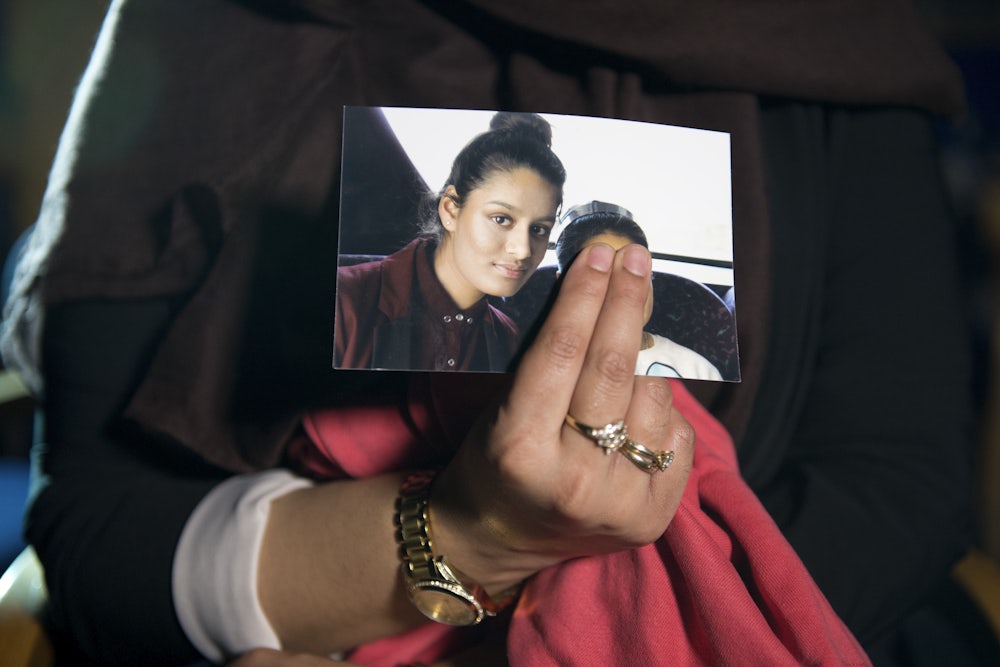Hoda Muthana, who grew up in Alabama, and Shamima Begum from London are both in Kurdish-run refugee camps in northern Syria. Both have infant children. And both have been told that, because they left their home countries to join the Islamic State several years ago and underwent arranged marriages to jihadist fighters, those countries will not take them back.
In Muthana’s case, the U.S. State Department denies that she has any right to citizenship. Lawyers for her family have filed papers arguing that she does, as she was born in the U.S. and her father says he surrendered his Yemeni diplomatic identity card prior to her birth. The United Kingdom meanwhile intends to strip Begum of U.K. citizenship on the basis that she has, or has the potential of having, Bangladeshi citizenship—relevant because, without it, it would be illegal under international law to do so: You cannot make someone stateless.
The U.S. and U.K. legal arguments are questionable. Bangladesh disputes that Begum has citizenship, and in Muthana’s case, if the papers filed by her lawyers are correct, she has prima facie birthright citizenship in the U.S. But even if Begum and Muthana could be legally disenfranchised in this way, it’s still a terrible idea.
The argument for denying these women citizenship and a right to return home is two-fold: They have “forfeited” their right (or “privilege”) of citizenship through action, and they pose an ongoing risk to our societies. The first argument relies on the idea that the women’s loyalty is to another state—in this case, the so-called Islamic State. Yet neither the U.K. nor the U.S. recognize the Islamic State, a fighting force claiming a Caliphate, as a state. The attempt to revoke or deny American or British citizenship instead rests on citizenship of another state—in these cases, Bangladesh and Yemen, the country of Muthana’s parents.
Refusing the women’s request for repatriation on the grounds that they present a threat involves similarly poor logic. We have no idea what threat if any, is posed by these former ISIS members, because proper assessment has not yet been carried out, and likely cannot be without repeated observation, interview, and so forth. Proper assessment itself demands that the women return. But supposing these women do present a risk, we cannot argue that domestic or regional security aims are better served by leaving them in a Syrian camp: As we now know, the Islamic State itself grew partly from the American policy of keeping large numbers of possible radicals in a detention camp in Iraq, where many Islamic State leaders likely met. Furthermore, if Muthana and Begum cannot stay in the camps indefinitely, which seems likely given Turkish plans for further actions against the Kurds in Syria, then the only option is for them to go to another country where they hold citizenship. Are war-torn Yemen or Bangladesh, both home to significant numbers of Islamic extremists, really better equipped to deal with Muthana and Begum than the U.K. or U.S.?
Seeking to deprive people of citizenship simply because we can sets a risky precedent: a race to disown extremists or “undesirable” people whenever it is legally possible to do so. States will be able to rid themselves of responsibility for dealing with people deemed a problem in favor of simply deporting them—an approach which, in an increasingly global age, seems neither moral nor strategic, from a security perspective.
Most importantly, we need to recognize how cases like these are gendered. As evidenced by the successful U.K. prosecution of Mohammed Uddin of terrorism-related offences, the prosecution of nine of twelve American returnees, and the upcoming trial against Ibraheem Musaibli, when men transgress we accept them back, confident that our judicial and particularly our penal systems are equipped to deal with male violence—even their extreme violence. Women present a problem: It’s hard to know what crimes if any they have committed beyond “membership of a proscribed organisation.” Moreover, because they don’t appear to have engaged in violence, we presume they can’t really have been that committed to “the cause”; there must be some other reason. Lawyers for Samantha Elhassani, the only American woman repatriated from Iraq so far and who now awaits trial for supporting ISIS, have played up “victim” narratives, pointing to an abusive husband and saying she was “duped” into joining. European Women being tried in Iraq for supporting ISIS make similar claims, although the courts there are more skeptical of their arguments.
Muthana and Begum do not claim to have been victims, but neither do they appear to have participated in violence. We don’t know how to handle them. Going by outraged op-eds, these women particularly offend Western sensibilities by having preferred ISIS to the West, rejecting the idea that the West is good for all women and especially Muslim women. They are insufficiently grateful, refusing to be the “good victims” we demand—ones who can be saved. Such reactions have a distinct colonial feel to them. And the result, prosecuting male returnees while now refusing even to repatriate female ones, effectively gives women less of a path to atonement and redemption than their more clearly prosecutable male counterparts.
If governments reject these women’s applications to return, they will be signaling that this action is essential for security whilst asserting that failed or poorly resourced states are better equipped to handle potential extremists. They will be establishing a precedent whereby states seek to disenfranchise those with dual citizenship whenever they are deemed problematic, creating buck-passing problems for international law and security. They will be undermining existing efforts to prevent and counter violent extremism. And they will be reinforcing colonial narratives and stereotyped gender assumptions which are actively damaging to efforts to prevent and counter violent extremism. Surely it would be better to treat these women like any other citizens who may have committed a crime: Take them back and let the justice system sort it out. Deeming extremist women uniquely impossible to repatriate—or undeserving of repatriation—helps no one.
